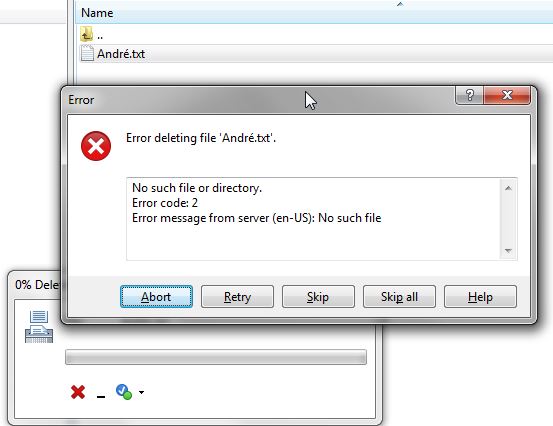SFTP file name problems with foreign characters
When using special characters (e.g. French 'é' or German Umlaute 'ä') in filenames in SFTP mode, then the filename is shown correctly in WinSCP but you cannot access the file (delete, open etc.). You see the file but when try deleting it the following error message is shown (see also attachment):
You can easily reproduce the bug when using another SFTP client (e. g. Bitvise) and create a file with name 'André.txt' in an SFTP directory. Then open that directory with WinSCP - as said, the name is correctly shown in WinSCP, but the deletion fails.
Strange is also that if you create a file in WinSCP with the same name 'André.txt' in the SFTP directory, then it is not shown as 'André.txt' but as 'Andr?.txt'. This file is also deletable.
Using WinSCP 5.13.3 with “Commander” interface on Windows 7, as stated with protocol SFTP. Its the same behaviour for all settings regarding 'Login -> Environment -> UTF-8 encoding for filenames' (Auto, On, Off).
No such file or directory.
Error code: 2
Error message from server (en-US): No such file
You can easily reproduce the bug when using another SFTP client (e. g. Bitvise) and create a file with name 'André.txt' in an SFTP directory. Then open that directory with WinSCP - as said, the name is correctly shown in WinSCP, but the deletion fails.
Strange is also that if you create a file in WinSCP with the same name 'André.txt' in the SFTP directory, then it is not shown as 'André.txt' but as 'Andr?.txt'. This file is also deletable.
Using WinSCP 5.13.3 with “Commander” interface on Windows 7, as stated with protocol SFTP. Its the same behaviour for all settings regarding 'Login -> Environment -> UTF-8 encoding for filenames' (Auto, On, Off).
